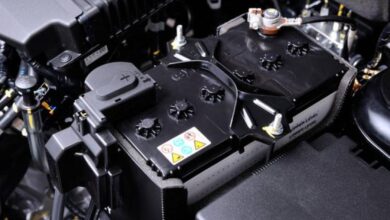A Detailed Guide: How Much Does A Car Battery Weigh
Last Updated on July 27, 2022 by Thomas James
Batteries are a critical component of everyday life. They are used to power devices and power trains. They are also something everyone needs on a daily basis. Batteries can be found in cars, phones, and even our homes.
They are often the most overlooked component of our everyday life, but they are important. The average battery weighs around 40 pounds. This blog post will help you find out how much does a car battery weigh?
A car battery is an essential part of every car and many other devices as well. They need to be checked now and then to make sure they continue to do their job as they should. A car battery can weigh a lot, so finding the right car battery is essential. You can’t always rely on your car to power you around.
With the right battery, this shouldn’t be a problem. Many people are guilty of just buying the most affordable car battery, but it might not be the right one for your needs. This blog post will look at the different battery types and what you can expect from the different costs associated with them.

Why Is Battery Weight Important?
As I have said, batteries are an essential part of our daily life. They are something that everyone needs to have. We need to know how much batteries weigh to be aware of what is going on with our car batteries. If we are not aware of how much a battery weighs, we will not know if it is safe to use.
It can be very dangerous, so it is essential to understand how much does a car battery weighs. If you have a heavy battery, you might not be able to drive. You could be stranded, or worse.
You also like: How To Tell Positive and Negative On A Car Battery?
A heavier car will require more gas or energy to travel the distance. It means your car won’t accelerate as quickly, and you’ll get less mileage, which will result in higher costs down the road. However, there are different types of batteries in the market you should know about.
Types of Batteries
There are many different types of batteries, and each one has its own pros and cons. Here are some of the most common types of batteries you’ll find in a car:
Lead Acid Batteries
Lead-acid batteries are the most common type of battery, but they are also the most dangerous. They are used in many different devices. They are very reliable and affordable. Lead Acid batteries are hefty as they require a lot of maintenance. There are two types of lead-acid batteries: flooded and valve-regulated.
Flooded Lead Acid Batteries:
These are the most common type of lead-acid batteries. The battery has a separate tank of acid. And It is flooded with acid.
The acid is hazardous and very corrosive. They are not ideal for long-distance driving as they have a low energy density. They are often used in cars because they are very affordable. It is not the best battery for long-distance as it is not ideal for this type of use.
Valve-regulated Lead Acid Batteries:
These are also known as VRLA batteries. They are similar to flooded batteries, but the acid is not allowed to flood the battery. Instead, it is stored in a separate container.
Lightweight batteries
Lightweight batteries are very similar to flooded batteries, but they are smaller and lighter. They are also known as NiMH batteries. They are very reliable, and they are also very affordable. These batteries are ideal for small cars that want to save energy while still performing well. A lightweight battery weighing 10 to 20 pounds is perfect for fueling small vehicles.
Standard batteries
These batteries typically weigh 40 to 60 pounds on average. The size of the battery is frequently determined by the model of the vehicle and the amount of charge required.
Empty batteries
These batteries do not contain any lead-acid or lithium-ion components. Standard or heavy models typically weigh around 15 pounds, and empty lightweight models weigh about 7 pounds.
How Much Does A Car Battery Weigh?
One of the main reasons we need to know how much a car battery weighs is that we don’t want to damage our battery. We want to make sure that we don’t overload it. Overloading a battery will lead to a short circuit, which will cause the battery to explode.
On average, a car battery weighs around 40 pounds. It is the most common type of flooded lead-acid battery. There will be some exceptions, with some lighter and some heavier, but the majority will fall between 35 and 45 lbs.
Why Does Size Matter?
The size of the battery matters because it will determine how much power the battery can produce. A bigger battery can produce more power than a smaller battery. The size of the battery will also determine how much weight the battery will have. A smaller battery will be lighter and will be easier to carry.
If your car engine is large and powerful, it will require more power to run, necessitating a larger and heavier battery. Batteries weighing up to 50 pounds can be found in such cases!
Frequently Asked Questions
How long will a car battery last?
It depends on a lot of factors. How much the battery is used, how many times the battery is recharged, and how the battery is stored will all affect how long the battery will last.
Why do I need to replace a car battery?
The battery in your car is an essential part of the car. It is the power source for your car. A car battery is a heavy, expensive component that must be maintained regularly. Replacing your car battery is an important task.
How much does it cost to replace a car battery?
A new car battery can cost between $150 and $400. It depends on the model and the manufacturer.
Final Verdict
We hope you enjoyed our article on the weight of car batteries. If you’re wondering how much a car battery weighs, we’re here to provide you with an answer. It is a great place to start for any car owner looking for an easy way to find the weight of their car battery, and we hope it’s helpful to you. Please enjoy our blog and let us know if you have any questions or thoughts! Thank you for reading!










